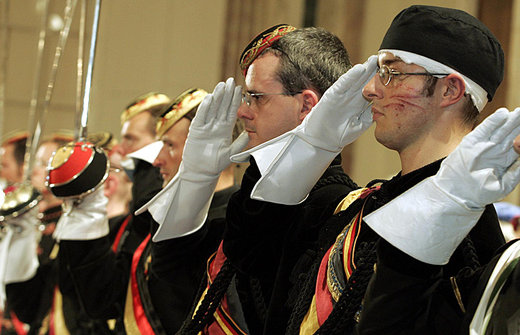Traditional student fraternities are under threat in Vienna as the local student union has called for a ban on their iconic uniforms and meetings in a move that has been criticised for infringing personal rights.
Founded after the liberation of Germany from Napoleon in the early 19th century, Burschenschaften, or student fraternities, were groups that cherished their new German identities, liberal politics, swordsmanship, and drinking beer.
The fraternities have survived very nearly 200 years of change in Germany and Austria since, but their continuing attachment to German nationalism and colourful pseudo-military Victorian uniforms of pillbox hats and sashes have now offended Vienna’s students union.
A representative for the Union said they wanted to “make a clear public statement against right-wing extremist and German nationalist ideology, as well as the weekly Burschibummel and the Akademikerball”, reports theLocal.at.
These events, which range from the informal weekly Burschibummel to the extremely formal annual Akademikerball have come under increasing fire from socialist groups, who see them as unacceptable expressions of politics and traditions they find distasteful.
Flash mobs and protest groups have met these events in recent years, with riot police called out to protect Vienna’s last Akademikerball. The Burschenschaften are also among the last practitioners of ‘academic fencing’, a traditional German form of the fencing sport which can result in serious injury. Opponents fight each other with sharp weapons without the masks or armour that would be considered normal in Anglosphere countries, and fight for honour.
Although the proposed ban is aimed at right-wing political groups, it would also have an unintended effect upon Vienna’s traditional Catholic societies, who do not share the same political views, but who wear similar clothes. A spokesman for Catholic Student Fraternities said the ban would “infringe on the personal rights of many students”.
The last major suppressions of Burschenschaften in Europe was by the Nazi Party in Germany and Austria, and by the Communists in Poland and other Eastern European countries where they were once common.

COMMENTS
Please let us know if you're having issues with commenting.